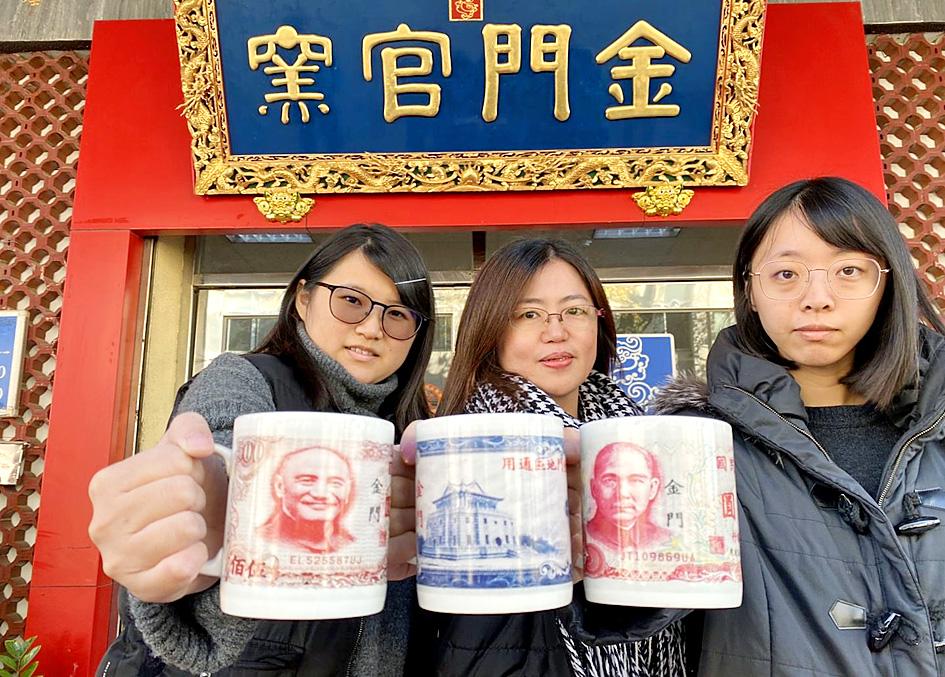Limited-edition mugs bearing the images of old Kinmen County banknotes have become popular with the county’s residents, who have been lining up to buy them, the kiln producing the mugs said.
Kinmen Official Kiln, which is the nation’s only government-run kiln, last month began producing the mugs bearing the image of an old NT$10 Kinmen banknote.
After they became hugely popular with locals, the kiln began producing mugs bearing images of NT$50 and NT$500 Kinmen banknotes in the hope that they would become popular gift items over the Lunar New Year holiday.

Photo: Wu Cheng-ting, Taipei Times
The Kinmen-only banknotes were used in the county from 1952 to 1989 to integrate the county’s economy with the rest of Taiwan, while mitigating the potential economic risk to Taiwan if Kinmen were to fall into communist hands.
The banknotes were issued by Bank of Taiwan and were identical to standard New Taiwan dollar bills, but bore the statement: “Only for use in the Kinmen area.”
“When Kinmen County Councilor Tsai Shui-yu (蔡水游) brought a mug printed with a US$1 bill on it to the factory I was reminded of wartime Kinmen and had the idea for the mugs,” kiln manager Yang Su-tai (楊肅泰) said.
Yang said that for him, Kinmen’s special currency is more unique than US dollar bills.
“It is symbolic of the front line and the efforts ... to protect the nation’s economy,” he said.
When the bank stopped issuing the bills in 1989, the banknotes slowly began to disappear, he said, adding that the mugs are a way to remember that part of history.
Making the mugs is a three-step process, he said, adding that each step involves firing the clay at very high temperatures.
Founded in 1962, the kiln has been commissioned to make replicas of valuable ceramic pieces for the National Palace Museum.
Yang, who retired on Saturday, said he was happy to see the last product he helped design at the kiln sell so well.
“It has been a long time since porcelain has caused such a stir,” he said.
The mugs can be purchased individually or in sets of three, he said.
“The NT$500 bill mug with Chiang Kai-shek (蔣介石) and the NT$10 bill mug with Sun Yat-sen (孫逸仙) are both red. They make for an auspicious gift for the Lunar New Year,” he said.

A group of Taiwanese-American and Tibetan-American students at Harvard University on Saturday disrupted Chinese Ambassador to the US Xie Feng’s (謝鋒) speech at the school, accusing him of being responsible for numerous human rights violations. Four students — two Taiwanese Americans and two from Tibet — held up banners inside a conference hall where Xie was delivering a speech at the opening ceremony of the Harvard Kennedy School China Conference 2024. In a video clip provided by the Coalition of Students Resisting the CCP (Chinese Communist Party), Taiwanese-American Cosette Wu (吳亭樺) and Tibetan-American Tsering Yangchen are seen holding banners that together read:

UNAWARE: Many people sit for long hours every day and eat unhealthy foods, putting them at greater risk of developing one of the ‘three highs,’ an expert said More than 30 percent of adults aged 40 or older who underwent a government-funded health exam were unaware they had at least one of the “three highs” — high blood pressure, high blood lipids or high blood sugar, the Health Promotion Administration (HPA) said yesterday. Among adults aged 40 or older who said they did not have any of the “three highs” before taking the health exam, more than 30 percent were found to have at least one of them, Adult Preventive Health Examination Service data from 2022 showed. People with long-term medical conditions such as hypertension or diabetes usually do not

POLICE INVESTIGATING: A man said he quit his job as a nurse at Taipei Tzu Chi Hospital as he had been ‘disgusted’ by the behavior of his colleagues A man yesterday morning wrote online that he had witnessed nurses taking photographs and touching anesthetized patients inappropriately in Taipei Tzu Chi Hospital’s operating theaters. The man surnamed Huang (黃) wrote on the Professional Technology Temple bulletin board that during his six-month stint as a nurse at the hospital, he had seen nurses taking pictures of patients, including of their private parts, after they were anesthetized. Some nurses had also touched patients inappropriately and children were among those photographed, he said. Huang said this “disgusted” him “so much” that “he felt the need to reveal these unethical acts in the operating theater

Heat advisories were in effect for nine administrative regions yesterday afternoon as warm southwesterly winds pushed temperatures above 38°C in parts of southern Taiwan, the Central Weather Administration (CWA) said. As of 3:30pm yesterday, Tainan’s Yujing District (玉井) had recorded the day’s highest temperature of 39.7°C, though the measurement will not be included in Taiwan’s official heat records since Yujing is an automatic rather than manually operated weather station, the CWA said. Highs recorded in other areas were 38.7°C in Kaohsiung’s Neimen District (內門), 38.2°C in Chiayi City and 38.1°C in Pingtung’s Sandimen Township (三地門), CWA data showed. The spell of scorching